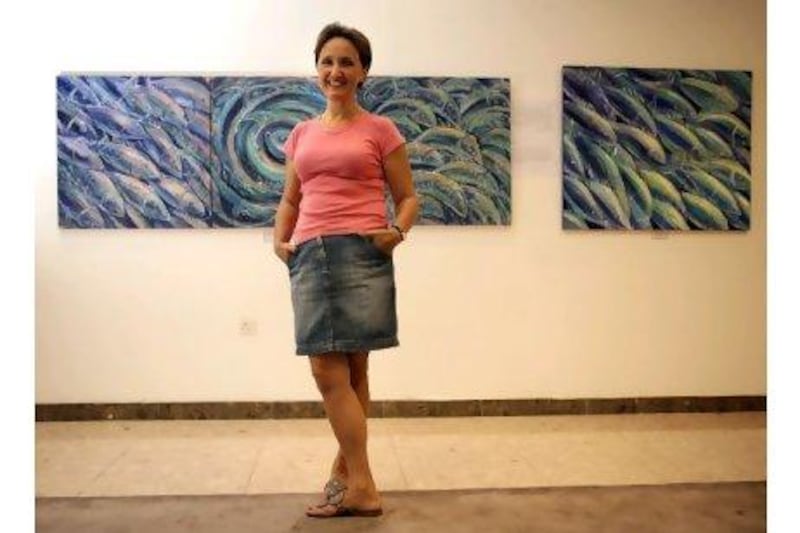FUJAIRAH // Boryana Korcheva had dreamed of becoming an artist all her life but it took the global recession to push her finally to pursue her passion.
When the economic downturn hit in 2008, Ms Korcheva - then working as a PR executive in Dubai - decided the drop in business could be liberating.
With her daughter attending medical school in the UK, she quit her job and moved with her husband to Fujairah to start the painting career she had longed for since her childhood in communist Bulgaria.
"I thought, instead of sitting and pitying myself for the downturn of business, I'd better change my life completely," said Ms Korcheva. "I thought that my chance was gone, that it would be in my next life because there was always work, there was rent to pay, school fees. I thought, 'Well, it wasn't meant to be'."
It turns out it was, judging from her recent exhibition at the Fujairah Tennis Club, where she was surrounded by her impressionist landscapes of dhows at Khor Fakkan, portraits of workers at the beach and the purple mountains of Wadi Hellu.
The exhibition, Whoosh!, was named after her triptych of fish caught in a whirl of motion and colour.
"In Fujairah, we live closer to nature and we live closer to each other," said Ms Korcheva. "With painting the fish there was this liberation, I felt this freedom to just go and splash out."
Ms Korcheva was 15 when she told her parents that she would be an artist. Their reaction was a firm "no". She grew up in communist Bulgaria, where art and sport showcased the regime's success. Artists were respected and the state was their biggest patron. Art was created for the people and state-owned companies commissioned large scale works and murals. Every town had a state-funded art gallery.
"Mind you, what was a lot of money for a piece of art in the Bulgarian economy would be peanuts compared to anywhere in the free economy," said Ms Korcheva. "But for the local economy it was great."
Competition meant that acceptance to art school could take years.
Ms Korcheva's parents urged her to attend an English language school, a privilege made possible by her high grades. To please them, she enrolled in Arabic studies at Sofia University, with the intention of transferring to the stage design programme at the Academy of Fine Arts. Sofia and the theatre promised the magic of an outside world.
"Having been confined, especially in our youth because we couldn't go backpacking and we couldn't go travelling, I was desperate to break free and see the wide world that was happening outside," said Ms Korcheva. "I said, 'OK, it's not going to be art, let it be languages'."
She soon fell in love with Arabic, began lecturing at Sofia University and was on track for a professorship when the communist government collapsed.
Not one to be put out by economic upheaval, Ms Korcheva used her English skills to secure a job at Daewoo, one of the first foreign companies to establish a presence in Bulgaria. Still curious for adventure, she came to Dubai in 1995 to work in public relations.
In 2008, global economics shifted her life once again. With opportunity thrust upon her, Ms Korcheva responded by devoting herself to painting under the "ruthless and honest" tutelage of the Dubai-based painter Tinko Trifonov, a fellow Bulgarian.
Ms Korcheva worked mainly from a home studio overlooking a panorama of white minarets and palms, giving herself a three-year deadline to open her own exhibition. The goal pushed her to create a collection she would be proud to showcase.
"All my life I've worked as a 9-to-6 employee and I just keep this momentum and this sense that I have a job to do today and I have to get up and do it," she said. "I really appreciate this combination of luck and circumstances a lot."
She is quick to credit Fujairah as her muse.
"There is this fantastic light when the sun sets behind the mountains and the whole world all of a sudden shimmers in these pinks and purples. It's amazing. People have to just stop and take a look.
"The Fujairah community, all the people who walk in these streets, can relate to my work for what it is and feel more excited about the place they live."
Mrs Korcheva's mother, once wary of the art world, now asks about her paintings each time they talk with evident pride in her voice. Her husband is also a supporter, she said, "because somebody has to pay the rent for an artist".
"I always wanted to be a patron of the arts," joked her husband, Philip Lonsdale.
"It's an investment in my future really. She'll be a patron of my future fishing trips."





